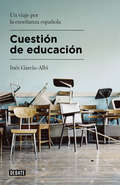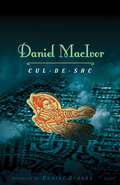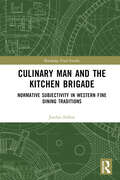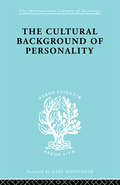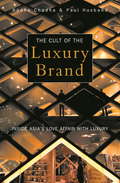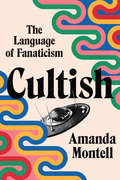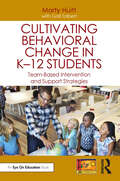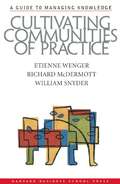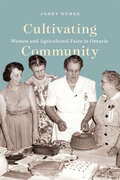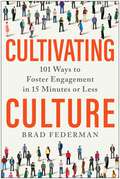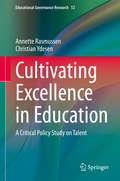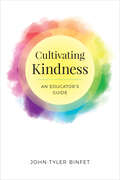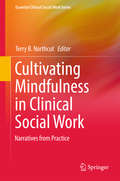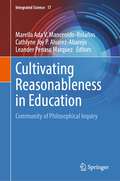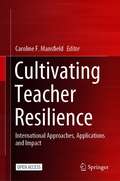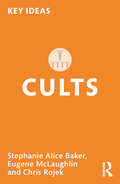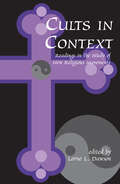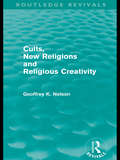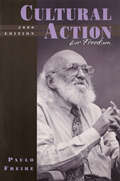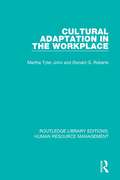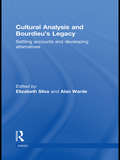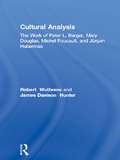- Table View
- List View
Cuenta contigo: No busques fuera, las soluciones están en ti
by Patricia RamírezPatricia Ramírez nos ofrece 20 propuestas para dejar de depender de los demás, tomar las riendas de nuestra propia vida y alcanzar así nuestros objetivos personales, profesionales y deportivos. Porque las soluciones a los propios problemas están mucho más cerca de lo que pensábamos: en nuestro propio interior. «Hay una fuerza motriz más poderosa que el vapor, la electricidad y la energía atómica: la voluntad.»Albert Einstein ¿En qué medida nuestro éxito personal, profesional y deportivo depende de nosotros? ¿Son los demás los que nos boicotean, estresan e impiden que alcancemos nuestros sueños? En Cuenta contigo Patricia Ramírez nos propone empezar a trabajar desde el propio interior para lograr nuestros propósitos. Si para empezar a hacer ejercicio necesitamos la compañía de un amigo, si para ser titular en nuestro equipo solo dependemos de la decisión del entrenador, o si para mejorar nuestro inglés esperamos que sea la empresa la que se encargue de nuestra formación, tal vez nunca logremos nuestros propósitos. ¿Por qué? Porque en estos tres casos, parece que el éxito dependerá de lo que los demás hagan por nosotros. Y esto es cómodo, pero poco eficaz. Patricia Ramírez nos propone que aprendamos a responsabilizarnos de nuestros objetivos, emociones y pensamientos; en definitiva, de las cosas que nos ocurren en la vida. Y nos ofrece herramientas prácticas para ese aprendizaje como la sorprendente terapia del caballo-secretaria o la de Teresa de Calcuta. Reseñas: «Leer a Patricia es aprender continuamente. La persona está antes que el deportista, y la gestión de todo lo emocional y el interior de las personas y deportistas son clave. El libro, tremendamente interesante; y ella, un referente para mí.»Xavier Budó, entrenador de tenis «Transitamos temporalmente portando un equipaje cargado de creencias e ideas no siempre idóneas para afrontar el viaje de la vida. En esta obra, Patricia Ramírez nos da claves para replantear y preguntar adecuadamente si aquello que nos acompaña en nuestro trayecto vital es lo más acertado o no. Obra clara, directa y tremendamente inspiradora.»Andoni Luis Aduriz, chef del restaurante Mugaritz «Patricia transmite fácil lo difícil, aporta soluciones a los problemas, y lo mejor de todo es que lo hace con una naturalidad tan cercana que te engancha desde el primer momento. ¡Sin lugar a dudas se ha convertido en una referente en nuestro deporte!»Alex Corretja, ex tenista «Nadie como Patricia Ramírez para ayudarte a darla mejor versión de ti mismo/a. Con sus "momentos libreta" entrenarás con Patri como si fueras un/a deportista de alta competición... en tu propia vida. Vive el presente (no temerariamente) y haz posible el futuro que quieres.»Juan Carlos Cubeiro, Head of Talent de ManpowerGroup y CEO de Right Management
Cues: Master the Secret Language of Charismatic Communication
by Vanessa Van EdwardsFor anyone who wants to be heard at work, earn that overdue promotion, or win more clients, deals, and projects, the bestselling author of Captivate, Vanessa Van Edwards, shares her advanced guide to improving professional relationships through the power of cues.What makes someone charismatic? Why do some captivate a room, while others have trouble managing a small meeting? What makes some ideas spread, while other good ones fall by the wayside? If you have ever been interrupted in meetings, overlooked for career opportunities or had your ideas ignored, your cues may be the problem – and the solution. Cues – the tiny signals we send to others 24/7 through our body language, facial expressions, word choice, and vocal inflection – have a massive impact on how we, and our ideas, come across. Our cues can either enhance our message or undermine it. In this entertaining and accessible guide to the hidden language of cues, Vanessa Van Edwards teaches you how to convey power, trust, leadership, likeability, and charisma in every interaction. You&’ll learn: • Which body language cues assert, &“I&’m a leader, and here&’s why you should join me.&” • Which vocal cues make you sound more confident • Which verbal cues to use in your résumé, branding, and emails to increase trust (and generate excitement about interacting with you.) • Which visual cues you are sending in your profile pictures, clothing, and professional brand. Whether you're pitching an investment, negotiating a job offer, or having a tough conversation with a colleague, cues can help you improve your relationships, express empathy, and create meaningful connections with lasting impact. This is an indispensable guide for entrepreneurs, team leaders, young professionals, and anyone who wants to be more influential.
Cuestión de educación: Un viaje por la enseñanza española
by Inés García-Albi¿Cómo es realmente la educación en España? ¿Cuáles son sus virtudes y cuáles sus defectos? Este libro es un esclarecedor recorrido por la educación española para aclarar el gran desconcierto y la confusión generalizada tras décadas de reformas contradictorias. La educación es un problema clave de España que nos afecta a todos: como alumnos, ex alumnos, padres o abuelos, profesores o simplemente como ciudadanos. Cuestión de educación es un diario de viaje, una road movie por el controvertido sistema educativo español. La periodista Inés García-Albi emprende un apasionante trabajo de campo por la enseñanza de este país para intentar descubrir qué es lo que ocurre con nuestro cuestionado sistema de educación. Inés vuelve a convertirse en alumna en colegios de todo tipo, interroga, indaga, busca respuestas a los principales temas que nos preocupan como padres y como ciudadanos. En Cuestión de educación se oye la voz de historiadores, políticos, inspectores, directores, profesores, madres, padres, alumnos, sindicalistas..., una respuesta coral que ofrece un panorama completo con sus luces y sombras, sus fracasos y logros (que también los hay) de la educación en este país.
Cul-de-sac
by Daniel Brooks Daniel MacivorIn his latest collaboration with director Daniel Brooks, MacIvor plays the role of Leonard, who narrates the events leading up to his murder while trying to understand them himself. Through the course of the play, we peer behind the curtains of his neighbourhood as MacIvor transforms into the multiple characters who bear witness to Leonard's life and death.
Culinary Man and the Kitchen Brigade: Normative Subjectivity in Western Fine Dining Traditions (Routledge Food Studies)
by Jordan FallonCulinary Man and the Kitchen Brigade offers an exploration of the field of normative subjectivity circulated within western fine dining traditions, presenting a theoretical analysis of the governing relationship between the chef, who embodies the Culinary Man, and the fine dining brigade.The book offers a unique treatment of western haute cuisine’s interlocking regime of labor and aesthetics and theorizes the underexplored kitchen brigade as a model of disciplinary formation. It deploys a heterogeneous set of disciplinary discourses and practices which have the effect of consolidating monopolies on epistemic authority and governance. Each position within the brigade’s hierarchy is subject to distinct, though related, disciplinary practices. Thus, chapters identify the specific practices pertinent to each brigade subject, while also illuminating how they fit together as a coherent hegemonic project. The application of Wynterian and Foucauldian insight to the fine dining brigade offers a political theory of culinary work which departs from other food studies texts. Notably, this work offers an in-depth treatment of the brigade’s colonial dimensions which resonate with emerging critiques, scholarly and general, of the race and gender politics of restaurant labor. The concluding chapters seek to identify where extant modes of resistance or alternative forms of culinary organization may hold the potential to move beyond the hegemonic overrepresentation of Culinary Man.This book will be of great interest to students and scholars from across the social sciences and humanities interested in critical food studies, political and cultural theory, and popular culinary culture.
Cult Backgrnd Persnlty Ils 84 (International Library of Sociology)
by Ralph LintonFirst Published in 1998. Routledge is an imprint of Taylor & Francis, an informa company.
Cult of the Luxury Brand
by Paul Husband Radha ChadhaWith Hong Kong boasting more Gucci and Hermäs stores than New York or Paris, and 94% of young women in Tokyo owners of a Louis Vuitton bag, the Asian consumer is a new target for brand-creation. TheCult of the Luxury Brand illuminates the mysterious inner workings of Asia's love affair with luxury for business professionals and intrigued consumers alike.
Cultish: The Language of Fanaticism
by Amanda Montell“One of those life-changing reads that makes you see—or, in this case, hear—the whole world differently.” —Megan Angelo, author of Followers“At times chilling, often funny, and always perceptive and cogent, Cultish is a bracing reminder that the scariest thing about cults is that you don't realize you're in one till it's too late.”—Refinery29.comThe New York Times bestselling author of The Age of Magical Overthinking and Wordslut analyzes the social science of cult influence: how “cultish” groups, from Jonestown and Scientologists to SoulCycle and social media gurus, use language as the ultimate form of power.What makes “cults” so intriguing and frightening? What makes them powerful? The reason why so many of us binge Manson documentaries by the dozen and fall down rabbit holes researching suburban moms gone QAnon is because we’re looking for a satisfying explanation for what causes people to join—and more importantly, stay in—extreme groups. We secretly want to know: could it happen to me? Amanda Montell’s argument is that, on some level, it already has . . .Our culture tends to provide pretty flimsy answers to questions of cult influence, mostly having to do with vague talk of “brainwashing.” But the true answer has nothing to do with freaky mind-control wizardry or Kool-Aid. In Cultish, Montell argues that the key to manufacturing intense ideology, community, and us/them attitudes all comes down to language. In both positive ways and shadowy ones, cultish language is something we hear—and are influenced by—every single day. Through juicy storytelling and cutting original research, Montell exposes the verbal elements that make a wide spectrum of communities “cultish,” revealing how they affect followers of groups as notorious as Heaven’s Gate, but also how they pervade our modern start-ups, Peloton leaderboards, and Instagram feeds. Incisive and darkly funny, this enrapturing take on the curious social science of power and belief will make you hear the fanatical language of “cultish” everywhere.
Cultivating Behavioral Change in K–12 Students: Team-Based Intervention and Support Strategies
by Marty Huitt Gail TolbertCultivating Behavioral Change in K-12 Students provides in-service educators with a long-term, team-based approach to enhancing their interventions and supports for struggling students. Given the clear visibility of trauma, crisis, and clinical challenges among children today, it is more important than ever that school professionals have the tools to create a more consistent culture of care at their schools. This book is driven by tried-and-true strategies refined across the three decades of implementation of the Behavior Intervention Support Team (BIST) Model. Comprehensive and compassionate, these evidence-based practices target the sustainable transformation of young learners’ behavior and help to shift the mindsets of the adults working with them. Principals, administrators, mental health practitioners, and teacher-leaders will be better prepared and motivated to collaborate toward student behavioral change, foster productive relationships with children and families, encourage learners to hone skills specific to behavior management, and more.
Cultivating Communities of Practice: A Guide to Managing Knowledge
by Etienne Wenger Richard A. Mcdermott William SnyderIn order to find out how to make the best use of the knowledge that a company's employees possess, the authoring consultants lift models from Xerox, Daimler Chrysler and the World Bank to show how to tap into the wisdom within.
Cultivating Community: Women and Agricultural Fairs in Ontario (McGill-Queen's Rural, Wildland, and Resource Studies)
by Jodey NurseFor close to two hundred years, families and individuals across Ontario have travelled down country roads and gathered to enjoy seasonal agricultural fairs. Though some features of township and county fairs have endured for generations, these community events have also undergone significant transformations since 1850, especially in terms of women’s participation.Cultivating Community tells the story of how women’s involvement became critical to agricultural fairs’ growth and prosperity. By examining women’s diverse roles as agricultural society members, fair exhibitors, performers, volunteers, and fairgoers, Jodey Nurse shows that women used fairs’ manifold nature to present different versions of rural womanhood. Although traditional domestic skills and handicrafts, such as baking, needlework, and flower arrangement, remained the domain of women throughout this period, women steadily enlarged their sphere of influence on the fairgrounds. By the mid-twentieth century they had staked out a place in venues previously closed to them, including the livestock show ring, the athletic field, and the boardroom.Through a wealth of fascinating stories and colourful detail, Cultivating Communities adds a new dimension to the social and cultural history of rural women, placing their activities at the centre of the agricultural fair.
Cultivating Culture: 101 Ways to Foster Engagement in 15 Minutes or Less
by Brad FedermanAS SEEN IN HR PROFESSIONALS MAGAZINE Perhaps your company culture is immortalized in a mission statement on your website or framed on your office walls, but how often are you actively cultivating those values? Culture cannot be a set-it-and-forget-it aspect of your business. Weaving culture-building into your daily and weekly activities strengthens the engagement of your people and reinforces the key principles of your desired culture, making it a reality. In Cultivating Culture, author, speaker, and leadership coach Brad Federman provides actionable tools for immediately promoting better teamwork, creating two-way conversations with your people, and gaining better feedback about how things are really going. With the belief that we are what we talk about, Federman offers more than 100 ways to engage your team in conversations that matter. Make your meetings about more than tasks, deadlines, and problems, and instead utilize Cultivating Culture&’s pre-meeting notes and activities to grow a deeper understanding of the work you&’re doing and why. Activities are divided into eight key focus areas: Leadership Communication Talent development Inclusion Team harmony Solution seeking Safety Serving your customers Regular attention to these principles will not only sustain your culture and amplify the presence of your values at work, but result in exponential growth in all of your endeavors. Cultivating Culture is your practical, accessible guide to becoming the most effective leader you can, 15 purposeful minutes at a time.
Cultivating Excellence in Education: A Critical Policy Study on Talent (Educational Governance Research #12)
by Christian Ydesen Annette RasmussenThis book critically analyses the current education political strategy of cultivating excellence in education. It shows how the new policy for selecting talented students in Denmark deconstructs the compromise from which the comprehensive school was built and reduces equal opportunities. It discusses how the current practice of measurement, selection and guidance of talented students brings about significant changes in education policies, in pedagogic practices, a restructuring of school organisations, and changed requirements of teachers. It explains how the internal differentiation of education systems based on self-selection and free choice, but also on new assessment techniques, tends to widen the inequality gap between students. The analysis clearly shows the relationship between the circulation of new ideas and normative frameworks at international level, and their transfer into national policies, while situating these developments in a socio-historical perspective. The book illustrates by means of a concrete case study with important empirical data that demonstrate the reality and influence of this new policy on the day-to-day work of teachers.
Cultivating Kindness: An Educator’s Guide
by John-Tyler BinfetCultivating Kindness sheds light on just how children and adolescents are kind, especially in school. Grounded in psychological and educational research on kindness and supported with illustrations capturing the voices of public school students, this book enhances our understanding of kindness. Written with educators in mind, Cultivating Kindness draws from surveys and interviews with more than three thousand children and adolescents. Author John-Tyler Binfet shares perspectives on kindness from the very individuals we hope will embrace kindness. Interwoven among examples from students are findings from peer-reviewed studies on topics exploring the role of joy and stress contagions on fostering or thwarting kindness, the concept of kind discipline, and how to measure kindness in school. This book also includes a kindness checklist to guide educators wishing to implement and foster kindness in their classrooms or schools. In addition to practical scenarios challenging the reader to respond kindly, a repository of kindness resources to support the continued kindness education of readers is also included.
Cultivating Mindfulness in Clinical Social Work: Narratives from Practice (Essential Clinical Social Work Series)
by Terry B. NorthcutThis practice-focused resource integrates broad therapeutic knowledge with current neuroscience to present vast possibilities for mindfulness in clinical social work. Seasoned practitioners posit mindfulness practice and process as a significant bridge between taking care of self and taking care of others, demonstrating its implications for physical and mental health in personal and professional contexts. Case studies show timeless concepts (e. g. , acceptance) and new mindfulness-based ideas (e. g. , learned helpfulness) in use in individual treatment as well as couples counseling and group interventions. Also attesting to the utility of mindfulness across problems, settings, and practitioner orientations, diverse applications are organized along ten robust lenses, among them: * Beginning with the context: the mind-body conundrum. * Beginning with the body: the neurobiology of mindfulness. * Beginning with the training: training clinicians in essential methods for integrating mindfulness in clinical practice. * Beginning with the clients: mindfully reconciling opposites with survivors of trauma/complex traumatic stress disorders. * Beginning with the symptom: incorporating mindfulness in the treatment of substance misuse. * Beginning with the larger social system: mindfulness and restorative justice. Clinicians and research professionals particularly interested in psychotherapy treatment and mindfulness practice will find Cultivating Mindfulness in Clinical Social Work not only stimulating and intriguing, but also a fresh source of real-world wisdom.
Cultivating Reasonableness in Education: Community of Philosophical Inquiry (Integrated Science #17)
by Marella Ada V. Mancenido-Bolaños Cathlyne Joy P. Alvarez-Abarejo Leander Penaso MarquezThis book focuses on the real-world application of the Philosophy for/with Children (P4wC) pedagogy to cultivate reasonableness in individuals through communities of philosophical inquiry. It presents a collection not only of theories but, more importantly, of experiences, discoveries, and innovations on P4wC by scholars, trainers, advocates, and practitioners around the world. Each chapter provides readers with insights and lessons that have resulted from the continuous application, exploration, and enrichment of the concepts, principles, and practices that were developed by Matthew Lipman and Ann Margaret Sharp into what P4wC is today - a dialogic pedagogical approach that may just be what is needed at a time when reasonableness and dialogue are essential to maintaining global stability and progress. In this light, this book also looks into how the P4wC approach can be practiced with adults such as when it is employed in various settings or contexts such as in business consulting, textbook writing, peace education, and extremism prevention, among others. Furthermore, this book also features chapters that discuss how the P4wC pedagogy can be beneficial once integrated into processes such as classroom teaching, teacher education, bioethics, and employee education. This book provides valuable insights about how reasonableness that is cultivated through building communities of philosophical inquiry in education can be a powerful tool for nation-building and social transformation.
Cultivating Success in the South
by Louis A. Ferleger John D. Metz"This book explores changes in rural households of the Georgia Piedmont through the material culture of farmers as they transitioned from self-sufficiency to market dependence. The period between 1880 and 1910 was a time of dynamic change when Southern farmers struggled to reinvent their lives and livelihoods. Relying on primary documents, including probate inventories, tax lists, state and federal census data, and estate sale results, this study seeks to understand the variables that prompted farm households to assume greater risk in hopes of success as well as those factors that stood in the way of progress. While there are few projects of this type for the late nineteenth century, and fewer still for the New South, the findings challenge the notion of farmers as overly conservative consumers and call into question traditional views of conspicuous consumption as a key indicator of wealth and status"--
Cultivating Teacher Resilience: International Approaches, Applications and Impact
by Caroline F. MansfieldThis open access book follows the development of the Building Resilience in Teacher Education (BRiTE) project across Australia and internationally. Drawing on the success of this project and the related research collaborations that have since emerged, it highlights the importance of cultivating resilience at various stages of teachers’ careers.Divided into three sections, the book includes conceptual, empirical and applied chapters, designed to introduce readers to the field of research, provide empirical evidence and showcase innovative applications. The respective chapters illustrate the ways in which teacher resilience can be enhanced in a variety of contexts, and address specific learning activities, case studies, resources and strategies, student feedback and applied outcomes. They also consider future directions including cross-cultural applications and the use of technologies such as augmented reality. The book will appeal to researchers, teacher educators and teachers, as well as those interested in supporting the cultivation and ongoing development of professional resilience for pre-service and practicing teachers.
Cults (Key Ideas)
by Chris Rojek Stephanie Alice Baker Eugene McLaughlinThis engaging text introduces readers to the sociology of cults. Covering the history and current state of cult studies, this book includes topics ranging from doomsday cults and new religious movements through to self-help cults, the cult of celebrity, intellectuals, and entrepreneurs. Case studies as varied as David Koresh and the Branch Davidians, the Manson family, and the cult brands of Elon Musk, Andrew Tate and Jordan Peterson are deployed to shed new light on cult formation in the twenty-first century. Amidst the rise of populist demagogues, the online radicalisation of alienated individuals, and the proliferation of celebrities and gurus with avid followings, cult dynamics are everywhere in society. Yet key urgent questions have not been clearly and concisely addressed: What are cults? Why do they emerge? How are they established and maintained? What is the future of cults, and why are we so fascinated by them? This book explores these questions by tracing the spectrum of cult formation historically and in today’s networked media ecosystem. This accessible introduction to the darkly fascinating world of cults is essential reading for academics and students of sociology, social psychology, religion, politics, business and cultural studies, and anyone interested in understanding the relationship between cults and society.
Cults in Context: Readings in the Study of New Religious Movements
by Lorne DawsonIn the face of the increasingly variegated ideological landscape of contemporary America, cults have become the focus of public controversy. The growth of new religions has been matched by the development of an organized and vocal opposition, the anti-cult movement. This in turn has prompted an extensive investigation of new religious movements (NRMs) by sociologists and psychologists of religion, as well as historians and religious studies scholars. The readings collected here contribute to the debate about cults by sampling some of the best and most accessible publications from the academic study of NRMs.The contributors address the questions most commonly asked about cults, such as: What brought about the emergence of new religious movements? What is a cult or new religious movement? Who joins new religious movements and why? Are converts to new religious movements brainwashed? Why did the Jonestown and Waco tragedies happen? Are cults inclined to be violent? What does the emergence of so many new religious movements say about our society? What does it say about the future of religion?Cults in Context surveys the descriptive typologies, theories, and data accumulated by sociologists and psychologists studying new religious movements over the last twenty years. It serves to defuse many popular fears and misconceptions about cults, allowing the reader to develop a more reasonable and tolerant understanding of the people who join new religious movements and the functions of these movements in contemporary society.
Cults, New Religions and Religious Creativity (Routledge Revivals)
by Geoffrey NelsonThe twentieth century has been marked by an unprecedented outburst of religious activity on a world-wide scale, and in particular by a mushrooming of numerous religious movements. This work, first published in 1987, takes a fresh approach to the understanding of this phenomenon, an approach which takes into account new concepts of human nature and of religion.
Cultural Action for Freedom (HER Reprint Series)
by Paulo FreireIn this volume, we have chosen to highlight the importance of education to human rights by reprinting two articles written by Paulo Freire (1921-1997) in 1970 for the Harvard Educational Review.
Cultural Adaptation in the Workplace: Opinion Of The Attorney-general Upon The Title Proposed To Be Given By The New Panama Canal Company To The United States (classic Reprint) (Routledge Library Editions: Human Resource Management)
by Martha Tyler John Donald G. RobertsThe purpose of this book, first published in 1996, is to explore the dimensions of the changing workforce, and examines the issues faced by non-native workers and their employers. This study aims to explore issues such as culture shock and cultural adaptation in the healthcare, fast food and hotel industries in Washington, DC Metropolitan Area. This title will be of interest to students of business studies and sociology.
Cultural Analysis and Bourdieu's Legacy: Settling Accounts and Developing Alternatives (CRESC)
by Elizabeth SilvaCultural Analysis and Bourdieu’s Legacy explores the achievements and limitations of a Bourdieusian approach to cultural analysis through original contributions from distinguished international scholars. This edited collection offers sustained critical engagement, substantiated by new empirical work. It presents concrete evidence of different approaches to the interpretation of culture in Britain, France and the USA. Discussions are situated in relation to current debates about cultural analysis, in particular the vibrant and extensive disputes concerning the applicability of Bourdieu’s concepts and methods. Subsequently, implications for the future of research work in cultural analysis, including into theory and methods, are drawn. The contributing authors offer key interpretations of the work of Bordieu, arguments for alternative approaches to cultural analysis, and critical applications of his concepts in empirical analysis. This book is essential reading for graduate students of sociology, cultural studies, social anthropology or cultural geography, providing great insight into the work of one of the most eminent contemporary scholars in the field of cultural analysis.
Cultural Analysis: The Work of Peter L. Berger, Mary Douglas, Michel Foucault, and Jürgen Habermas (Routledge Library Editions: Michel Foucault)
by Robert Wuthnow James Davison Hunter Albert J. Bergesen Edith KurzweilFirst published in 1984, Cultural Analysis is a systematic examination of the theories of culture contained in the writings of four contemporary social theorists: Peter L. Berger, Mary Douglas, Michel Foucault, and Jürgen Habermas. This study of their work clarifies their contributions to the analysis of culture and shows the converging assumptions that the authors believe are laying the foundation for a new approach to the study of culture. The focus is specifically on culture, a concept that remains subject to ambiguities of treatment, and concentrates on questions concerning the definition and content of culture, its construction, its relations with social conditions, and the manner in which it may be changing. The books demonstrates how these writers have made strides towards defining culture as an objective element of social interaction which can be subjected to critical investigation.


